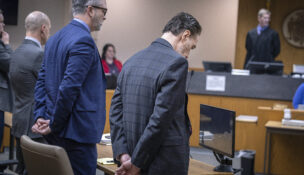Guilty plea no bar to malpractice claim
By: dmc-admin//June 15, 2005//
A guilty plea does not bar a defendant from then suing her former attorney for legal malpractice, the Wisconsin Supreme Court held on June 9.
In doing so, the court reversed a published decision of the court of appeals, Mrozek v. Intra Financial Corp., 2004 WI App 43, 271 Wis.2d 485, 678 N.W.2d 264.
Patricia Mrozek wanted to build a motel in Plover, Wisconsin, and obtain an AmericInn franchise for it. She retained the law firm of Mallery and Zimmerman, S.C., to incorporate Plover Motel, Inc.
To finance the project, Mrozek obtained investment loans totaling more than $500,000 from approximately 20 individuals. Mrozek represented to these investors that the loans would be used for the construction of the motel, which would ultimately generate a 10 percent return on their investments. When each loan was made, the investor received a note promising PMI would repay the principal of the loan, plus interest, within a specified time.
The motel project was unsuccessful, the corporation ended up in bankruptcy, and Mrozek was charged with 13 felony counts for willfully failing to disclose material facts in connection with the project.
Mrozek ultimately pleaded guilty to two counts of felony securities fraud and three counts of misdemeanor theft by fraud.
In the bankruptcy action, PMI listed a claim against Mallery & Zimmerman as an asset, but did not file a proof of claim, and the trustee did not pursue the claim.
Mrozek and PMI then sued Mallery and Zimmerman for legal malpractice, and breach of fiduciary duty. Portage County Circuit court Judge Frederic W. Fleishauer granted summary judgment to Mallery & Zimmerman, holding that under the doctrine of issue preclusion, the guilty plea barred the malpractice claim.
Fleishauer also dismissed PMI’s claim, concluding that the doctrine of claim preclusion prevented PMI from relitigating a claim that could have been raised in the bankruptcy proceedings.
The court of appeals affirmed, and the Supreme Court granted review. The court reversed in a decision by Justice Patience Drake Roggensack. Roggensack also wrote a separate concurrence to her own opinion.
Issue Preclusion
The court first held that issue preclusion does not bar Mrozek’s claims against the firm, because, in order for issue preclusion to limit subsequent litigation, the question of fact or law that is sought to be precluded must have actually been litigated.
|
What the court held Case: Mrozek v. Intra Financial Corp., No. 2002AP2448 Issue: Do guilty pleas to fraud charges bar the defendant from suing her former attorney for legal malpractice? Holding: No. Neither issue preclusion, judicial estoppel, nor public policy bar such a claim. Counsel: Robert J. Pluta Jr., Milwaukee; Michael H. Schaalman, Milwaukee, for appellant; James A. Bolt, New Berlin, for respondent. |
The court noted a split in jurisdictions whether a plea of guilty bars a malpractice action, and adopted the reasoning of the New Jersey Superior Court in Prudential Prop. & Cas. Ins. Co. v. Kollar, 578 A.2d 1238, 1240-1241 (N.J.Super.Ct.App.Div.1990):
“[A guilty plea] represents the decision of the defendant ‘to forego such litigation and usually for reasons having little or nothing to do with the nature of the issues.’ … The motives for the State and a criminal defendant to make a plea agreement are many. The State may be seeking to conserve its scarce resources by avoiding a trial and a defendant may be attempting to secure his freedom or at least a reduced term of incarceration. Such reasons have little or nothing to do with the determination of the issues in the [later action].”
The court added that, although a Wisconsin circuit court must be satisfied that the defendant committed the crime before accepting the plea, the inquiry is not the same as a fully litigated trial resulting in a determination that the facts prove the defendant committed the crime.
Accordingly, the court concluded that the guilty pleas do not fulfill the “actually litigated” requirement for issue preclusion to apply.
Public Policy
The court also concluded that neither judicial estoppel nor public policy bar Mrozek’s claim.
The court noted that a defendant may have reasons for pleading guilty that are not inconsistent with an allegation of legal malpractice; thus, judicial estoppel does not apply.
Turning to public policy, the court distinguished Evans v. Cameron, 121 Wis.2d 421, 360 N.W.2d 25 (1985), in which the court upheld the dismissal of a malpractice claim, alleging that the attorney advised the client to commit perjury.
The court wrote in Evans, “A court should not encourage others to commit illegal acts upon their lawyer’s advice by allowing the perpetrators to believe that a suit against the attorney will allow them to obtain relief from any damage they might suffer if caught.” Id. at 428.
Distinguishing Evans, the court wrote, “In Evans, the act of perjury was so clearly wrongful that even without the advice of attorneys, Evans would have understood her actions were illegal. We also note that Mallery’s position before the Securities Commissioner was that Mrozek’s actions were not illegal (cites omitted).”
PMI
The court next held that the doctrine of claim preclusion does not bar the claims of PMI against the firm, because the trustee abandoned the claims. When a debtor’s claim is abandoned by the trustee in bankruptcy, it reverts to the debtor, as if no bankruptcy petition was filed.
Thus, the court concluded the final order closing the bankruptcy is not a final judgment to an abandoned claim, and claim preclusion does not bar the claim from being reasserted by the debtor.
However, the court affirmed the circuit court’s dismissal of the claims by both PMI and Mrozek relating to lost profits, concluding the evidence that the corporation would have made profits was too speculative.
Accordingly, the court reversed the grant of summary judgment in favor of the firm, save for the lost profits claim.
| |
||
|
Related Links Related Article |
||
| |
||
Concurrence
Justice Roggensack wrote a separate concurring opinion, in addition to the lead opinion, to opine that the court of appeals should not apply issue preclusion when the circuit court has not considered the question, because the decision to apply issue preclusion is a discretionary one.
Roggensack wrote, “An appellate court is to review a circuit court’s exercise of discretion, not exercise discretion without the benefit of either a circuit court decision or circuit court record developed in response to a party’s assertion that issue preclusion should be applied. Therefore, although it is possible for an appellate court to conclude that issue preclusion is not available as a matter of law, as we have here, because the same issue was not actually litigated in the prior proceeding, it is not appropriate for the court of appeals to apply issue preclusion as the initial decision maker.”
Click here for Case Analysis.
David Ziemer can be reached by email.
Legal News
- FBI launches criminal investigation into Key Bridge collapse
- Man charged in slaying after woman’s leg found at Milwaukee-area park
- Minnesota man guilty in fatal stabbing of teen on Wisconsin river, jury finds
- Wisconsin teen sentenced in bonfire explosion that burned at least 17
- Wisconsin man who broke into home, ate victim’s chicken, slept in victim’s bed, receives prison and jail sentences
- Judge refuses to dismiss Hunter Biden’s gun case
- House passes reauthorization of key US surveillance program after days of upheaval over changes
- Milwaukee Police officer traveling to Georgia training retires before facing discipline
- Evers to ask legislature to approve largest increase in state support for UW System in two decades
- 7th Circuit Court of Appeals proposes new rules
- Federal agencies allege toxic work environment for women in new report
- Wisconsin man sentenced for sex trafficking a woman and a minor online
WLJ People
- Power 30 Personal Injury Attorneys – Russell Nicolet
- Power 30 Personal Injury Attorneys – Benjamin Nicolet
- Power 30 Personal Injury Attorneys – Dustin T. Woehl
- Power 30 Personal Injury Attorneys – Katherine Metzger
- Power 30 Personal Injury Attorneys – Joseph Ryan
- Power 30 Personal Injury Attorneys – James M. Ryan
- Power 30 Personal Injury Attorneys – Dana Wachs
- Power 30 Personal Injury Attorneys – Mark L. Thomsen
- Power 30 Personal Injury Attorneys – Matthew Lein
- Power 30 Personal Injury Attorneys – Jeffrey A. Pitman
- Power 30 Personal Injury Attorneys – William Pemberton
- Power 30 Personal Injury Attorneys – Howard S. Sicula











